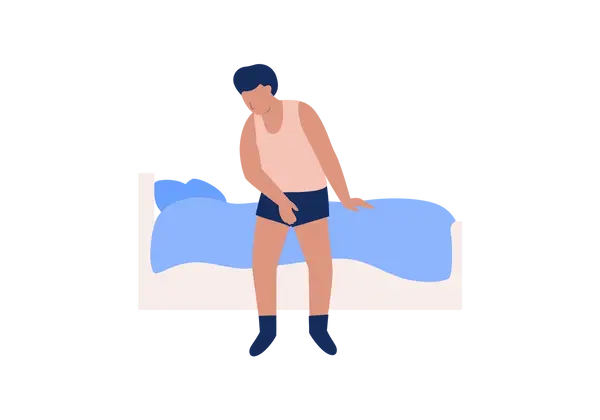Back
Navigating Penile Pain: Causes and the Role of Pelvic Floor Physical Therapy
By Dr. Christine Martirez PT, DPT on 2/16/2024

Penile pain is a sensitive and often overlooked issue that can significantly impact a man's quality of life. Understanding the potential causes of penile pain is essential for seeking effective solutions. In this blog post, we'll explore common reasons behind penile discomfort and shed light on how pelvic floor physical therapy can offer relief.
Unraveling the Causes of Penile Pain
Pelvic Floor Muscle Tension:
Pelvic floor muscles extend to the base of the penis, and tension or dysfunction in these muscles can contribute to penile pain. Causes include stress, anxiety, or trauma.Sexual Dysfunction:
Conditions such as erectile dysfunction, premature ejaculation, or Peyronie's disease can lead to penile pain during sexual activity.Inflammation and Infections:
Infections of the urinary tract, sexually transmitted infections (STIs), or inflammatory conditions like balanitis can cause pain in the penis.Trauma or Injury:
Trauma or injury to the genital area, whether from accidents, sports, or other incidents, may result in penile pain.Nerve Entrapment:
Entrapment or irritation of nerves in the pelvic region, such as the pudendal nerve, can cause referred pain to the penis.Prostate Issues:
Conditions affecting the prostate, such as prostatitis or benign prostatic hyperplasia (BPH), may cause penile discomfort.

The Role of Pelvic Floor Physical Therapy
Comprehensive Assessment:
Pelvic floor physical therapists conduct a thorough assessment to identify the root causes of penile pain. This includes evaluating muscle tone, nerve function, and the overall pelvic floor health.Pelvic Floor Muscle Relaxation:
Pelvic floor physical therapy employs techniques to release tension in the pelvic floor muscles. This may involve manual therapy, stretching exercises, and biofeedback to promote relaxation.Nerve Mobilization:
Therapists use nerve mobilization techniques to address any entrapment or irritation of nerves that may contribute to penile pain.Posture and Alignment Correction:
Correcting postural imbalances and ensuring proper alignment of the pelvis can alleviate stress on the pelvic floor muscles and reduce penile discomfort.Strengthening Exercises:
Targeted exercises are prescribed to strengthen and balance the pelvic floor muscles. This promotes optimal function and may reduce pain associated with muscle imbalances.Education and Self-Care:
Pelvic floor physical therapy provides education on lifestyle modifications, stress management, and self-care practices to empower individuals in managing and preventing penile pain.

Empowering Recovery
Psychosocial Support:
Pelvic floor physical therapy recognizes the interconnectedness of physical and emotional well-being. Therapists provide psychosocial support to address any emotional factors contributing to penile pain.Patient-Centered Care:
Every treatment plan is tailored to the individual's needs and goals. Patient-centered care ensures that the therapy addresses specific concerns and contributes to an effective recovery.Open Communication:
A key aspect of pelvic floor physical therapy is fostering open communication. Individuals are encouraged to share their experiences, concerns, and progress to optimize the effectiveness of the treatment.
A Path to Relief and Well-Being
Penile pain can be a challenging condition, but with the right approach, relief and improved well-being are attainable. Pelvic floor physical therapy offers a holistic and patient-centered approach to addressing the root causes of penile discomfort. By promoting relaxation, addressing muscle imbalances, and providing personalized care, individuals can embark on a journey toward comfort, confidence, and a fulfilling intimate life. If you are experiencing penile pain, consulting with a qualified healthcare professional, such as a pelvic floor physical therapist, is a crucial step toward understanding and managing your condition.
Read More:
How Visceral Mobilization Can Assist with the Treatment of SIBO By Dr. Christine Martirez PT, DPT on 10/22/2024 Learn about SIBO and how visceral mobilizations can be an integral part of your recovery journey Understanding Sacral Pain and How Pelvic Floor Therapy Can Help By Dr. Christine Martirez PT, DPT on 10/21/2024 Learn about sacral pain & how pelvic floor therapy can be an intregral part of your healing journey
Are you ready to live pain free?
Request An Appointment